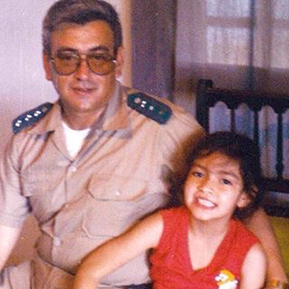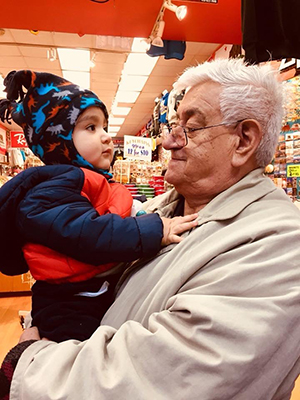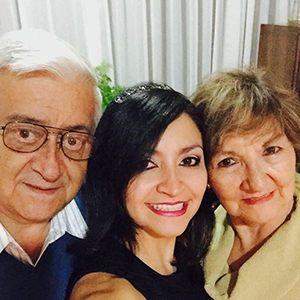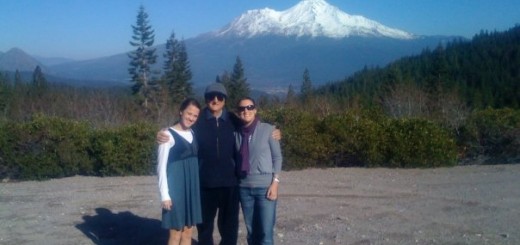Silicon Valley Walker shares resources with family in Bolivia
Barbara Chacón knew her father was having memory issues but didn’t know how to help. It wasn’t until she heard someone from the Alzheimer’s Association® speak about the disease that she learned there were resources available that could help her. Now, Barbara helps her family and her community by sharing what she has learned.

Forgetting family
Lizandro José Cortez lives with his wife, Lilia, and their grandson in Bolivia. Lizandro’s daughter, Barbara Chacón, lives in the Silicon Valley. While she doesn’t see her father very often, the few times he’s visited in the last several years, she’s noticed he has been having trouble remembering things. She also noticed he wasn’t as engaged in conversations as he used to be.
A distant relative had lived with dementia before Lizandro started showing similar symptoms. Barbara had her suspicions about her father’s odd behavior. She sent Lizandro memory games, hoping that it would help reduce the cognitive decline she’d been observing both on the phone and when he came to visit.
One day, when Barbara’s family was visiting her from Bolivia, Lilia left to take Barbara’s sister to the airport. Lizandro didn’t remember that Lilia had left and, not being able to find his wife, went to Barbara to ask where she was.
“I told him she went to the airport with my sister,” shared Barbara. “He asked me, “˜I have another daughter?’ That broke my heart.”
Finding resources
Barbara used to work as a producer for a local television station where the Alzheimer’s Association would occasionally come and speak on the morning show. “Sandra Green, a Family Care Specialist from the Alzheimer’s Association, would talk about Walk to End Alzheimer’s® and education seminars,” said Barbara. “They want to help out the Latino community.”
Evidence indicates that missed diagnoses of Alzheimer’s and other dementias are more common among Latinos/Hispanics. Latinos/Hispanics are about one and one-half times as likely to have Alzheimer’s or other dementias as older whites. By 2050 as many as 1.3 million Latinos could be living with Alzheimer’s.
It’s because of Sandra’s talks that Barbara was able to learn that there is more information and resources available to her that she never knew about.
“Before Sandra’s talk, I didn’t even know that there were so many resources available,” said Barbara. “Every time she came to the station to do an interview, I’d be super interested in what the Association was doing and try to take one step forward.”

Pandemic challenges
Due to the pandemic, Bolivia has placed restrictions on when people are allowed to leave home. Because of this, Lizandro’s daughter and granddaughter, who live nearby, can no longer visit as often as they used to. Lizandro doesn’t understand why he can’t leave his house or why no one visits.
As a veteran, Lizandro is used to waking up early for guard duty. Despite no longer being in the Army, he wakes up at 2 a.m. to stand watch over his home. Because he can’t be left on his own, Lilia also wakes up at 2 a.m. to stand watch over Lizandro. When Lizandro returns to bed after his “shift” is over, Lilia cannot afford that luxury. The day has begun, and there is work to do.
Each day, as the sun sets, Lizandro will find his suitcase and begin packing. He doesn’t recognize his home.
Despite numerous issues with his memory, no doctor has ever given Lizandro a diagnosis. No one has ever spoken with Lilia to explain to her what to expect on this caregiving journey. The doctors aren’t discussing which medications he’s taking that might make his symptoms worse.
They may live over 5,000 miles away from each other, but Barbara is grateful that her father still remembers who she is when she calls. “Whenever I talk to my dad, he knows who I am and who my baby is,” said Barbara. “That makes me happy, even if every 30 seconds he tells me about the book he’s reading.”

Educating the world
Living in the United States, Barbara has access to many resources about Alzheimer’s disease and other dementias, and is able to share what she learns with her family. However, her family was always receiving the information second hand from Barbara. That is, until the pandemic.
Because of the pandemic, the Alzheimer’s Association moved all of their education classes and conferences online. Since April, the Association was able to offer live education programs, not only to those living in the United States, but worldwide.
In June of 2020, the Alzheimer’s Association, Northern California and Northern Nevada Chapter hosted the first ever International Alzheimer’s Symposium in Spanish. It had over 950 attendees from 24 countries. Over 60% of the attendees were from other countries such as Mexico, Brazil, and of course, Bolivia.
With the help of her grandson and granddaughter, Lilia was able to participate in the three-hour event, and she loved it.
“If it wasn’t for COVID it would have just been another in-person event,” said Barbara. “This was a Zoom session. It didn’t matter where you were. What a great way to get people from all over the world.
“The Alzheimer’s Association wanted to reach people who speak Spanish. It’s an amazing community and we need all the information we can get to help our families overseas. Technology can be such a blessing. It was exciting to share this with my family.”
Getting involved
In addition to education conferences, Barbara was also inspired to participate in Walk to End Alzheimer’s. She walked for the first time in 2018. This year, she decided to take it one step further and joined the Silicon Valley Walk Committee.
“It’s a lovely group of people,” said Barbara. “We’re so diverse: different ages, different cultures and so many stories about the disease. The youngest people on the committee don’t know someone with Alzheimer’s, they just want to do something good in the world.”
Despite the pandemic, Barbara and the committee have been working hard to make the best of the situation. “We’re using Facebook stories, the hashtag (#Walk2EndAlz) and taking photos,” said Barbara.
“I learned you can create a Facebook fundraiser for your birthday. We’re getting creative, and it wouldn’t have happened if we weren’t in this situation.”

Become a volunteer
Our volunteers are passionate, inspired, and making a difference in the fight to end Alzheimer’s disease. The Alzheimer’s Association couldn’t provide as many services or make Walk to End Alzheimer’s run as smoothly without the help of amazing volunteers like Barbara.
Barbara encourages others to get involved with the Alzheimer’s Association. “Don’t wait until someone in your family get the disease,” said Barbara. “Help us find a cure so no one else gets it.”
Finding our strength
This year’s walk is different. We won’t be coming together in a big group. Instead we’re asking participants to walk with friends and family in their local communities following CDC guidelines. However, this has not diminished Barbara’s spirt and enthusiasm for Walk day.
“What we’re doing is very important this year,” said Barbara. “We want to make it bigger than it was before, especially because we can walk from everywhere. You can be in Canada, Australia, Bolivia or any part of the world. You can join that day or contribute to the event by donating.
“If you’ve been isolated, Walk day is a great way to feel like you’re part of a community. Even though we can’t do a huge gathering of people, I’m here and I’m walking on my block.
“I think seeing other people wearing purple will make us feel happy and give us a warm heart. That’s what people need.
“This pandemic has shown us what’s important in life. It hasn’t destroyed us. It has made us stronger. It has showed us how strong we are.”
You can join Barbara’s team, BARBARAMCTV or start your own team for the Silicon Valley Walk on October 17. We’re still coming together in 2020, even if it means trying something new. Learn about Walks in your area at alz.org/walk.
Interested in learning more about upcoming programs presented in Spanish? Visit tinyurl.com/2020OnlineSpanishEd.
Learn more:

















